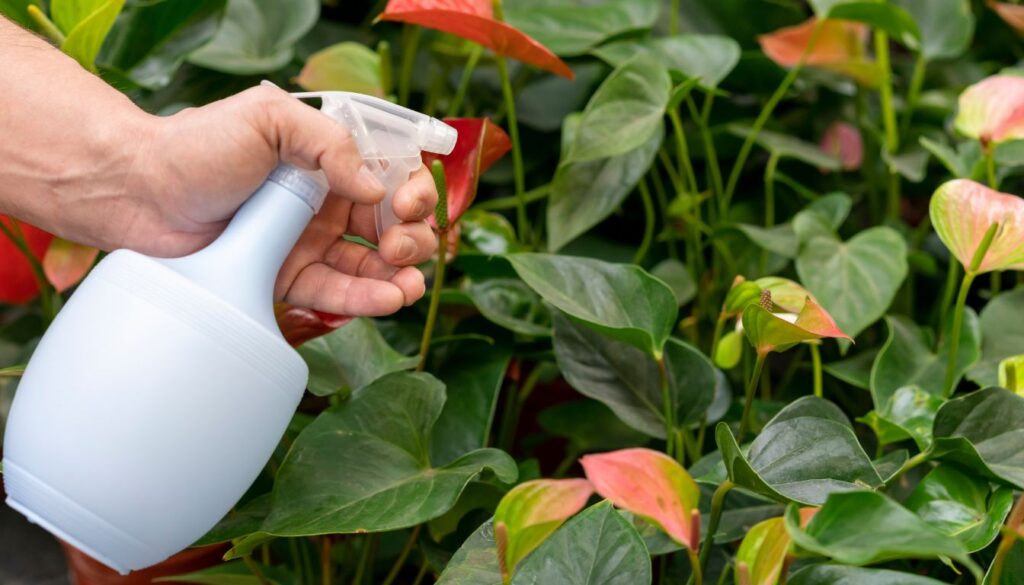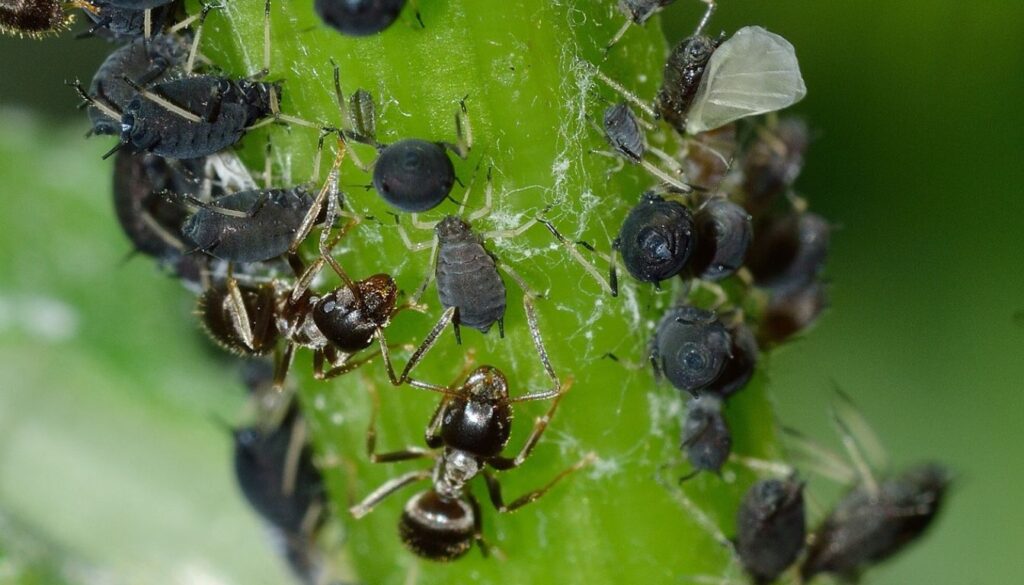If you’ve ever spotted tiny pests feasting on your favorite plants, you know just how frustrating aphids can be. These sap-sucking insects can cause real damage in the garden, but the good news is you don’t have to rely on harsh chemicals to fight them. I’ve found several simple home remedies that keep plants safe while being gentle on both family and pets.
Understanding Aphids
Aphids are tiny pests that wreak havoc on plants. These green or black insects suck sap from leaves and stems, leading to wilting and stunted growth. They’re quite the unwelcome guests in my garden.
What Are Aphids?
Aphids are soft-bodied insects belonging to the Aphididae family. They come in various colors, including green, yellow, and black. These pests reproduce quickly, often producing multiple generations in a single season. In my experience, a small cluster can become an infestation almost overnight.
Common Types of Aphids – Natural Home Remedies for Aphids: Eliminate Garden Pests
Several aphid species target gardens. Here are a few common types:
- Green Peach Aphid: This green pest prefers peach trees and other stone fruits. It creates a sticky residue called honeydew, attracting ants.
- Black Bean Aphid: The black bean aphid primarily feeds on legumes. Its name says it all; it’s often found on beans and peas.
- Melon Aphid: The melon aphid loves cucumbers and melons. It contributes to the spread of plant viruses, making it particularly troublesome.
Each of these aphids has its unique preferences, but all can be a gardener’s nightmare. Recognizing these differences makes it easier for me to target them effectively.
Home Remedies for Aphids

Aphids can wreak havoc on gardens, but home remedies can help manage these pests effectively. I’ve found several natural options that keep my plants safe and healthy.
Natural Ingredients Effective Against Aphids – Natural Home Remedies for Aphids: Eliminate Garden Pests
- Soap and Water Solution: Mixing a few drops of liquid soap with water creates a potent spray. This solution suffocates aphids and washes them off your plants. It’s gentle on the plants but tough on pests.
- Neem Oil: Derived from the neem tree, this oil disrupts aphids’ life cycle. Mix neem oil with water according to the instructions on the bottle. Spray it on affected plants weekly for the best results.
- Garlic Spray: Crushing garlic cloves and steeping them in water yields a natural repellent. Aphids dislike the strong scent, and it’s easy to make.
- Peppermint Oil: Adding a few drops of peppermint oil to water creates another effective spray. Its strong aroma drives aphids away without harming plants.
- Hot Pepper Spray: Blending hot peppers with water and straining the mixture produces a spicy deterrent. Aphids won’t stick around where it’s too hot for them.
Step-by-Step Guide to Making Home Remedies
- Prepare the Soap and Water Solution: Combine 2 teaspoons of mild liquid soap with 1 quart of water in a spray bottle. Shake it well.
- Mix Neem Oil: Follow the manufacturer’s instructions to dilute neem oil in water. Typically, you might add 2 tablespoons of oil to a gallon of water.
- Create Garlic Spray: Crush 2 or 3 garlic cloves. Steep them in 2 cups of water overnight. Strain the mixture and pour it into a spray bottle.
- Make Peppermint Oil Spray: Add 5 to 10 drops of peppermint oil to 1 quart of water in a spray bottle. Shake to mix well.
- Prepare Hot Pepper Spray: Blend 2 hot peppers with 2 cups of water. Strain the mixture and use it in a spray bottle.
Preventing Aphid Infestations
Preventing aphid infestations requires proactive approaches. By implementing a few key strategies, I can keep these pesky pests at bay.
Best Gardening Practices – Natural Home Remedies for Aphids: Eliminate Garden Pests
Maintaining healthy plants significantly reduces aphid risks. I focus on ensuring plants receive proper nutrients and water. Keeping my garden clean helps, too. I remove weeds and debris that can harbor pests. Regularly inspecting plants for early signs of aphids lets me address issues before they escalate. Encouraging beneficial insects, like ladybugs, provides natural pest control. These natural allies feast on aphids, keeping their populations low.
Plant Companions That Deter Aphids
Certain plants work wonders in deterring aphids. I often plant marigolds alongside vegetables. Their strong scent confuses aphids and drives them away. Herbs like basil and mint also help repel these pests. I love mixing them into my garden; their aroma not only delights me but also keeps aphids from settling in.
Additionally, planting garlic around vulnerable plants offers another layer of protection. The smell is pungent for us humans, but for aphids, it’s downright uninviting. Combining these companion plants creates a fortress against aphids, ensuring my garden stays healthy and vibrant.
When to Seek Professional Help
Sometimes, pests get out of hand. If I notice my plants covered in aphids despite my best home remedies, it’s time to call in the pros. When infestations appear overwhelming, professional pest control services can effectively manage the problem.
Another sign for professional help occurs when plants show severe distress. If leaves curl, turn yellow, or fall off rapidly, the situation might require more than home remedies. It’s also a red flag if the remedies cause plant damage, which indicates the infestation’s severity.
Regular inspections help catch problems early. However, if I find myself constantly battling aphids, my garden might benefit from expert guidance. Professionals can identify the specific aphid species and tailor treatment plans accordingly.
Lastly, if beneficial insects aren’t returning, I should consider professional assistance. These allies help keep aphids in check. An absence of ladybugs, lacewings, or other natural predators often means larger issues at play.
Ultimately, my garden’s health deserves the best care. When home remedies fall short and plants suffer, reaching out for professional help can turn things around.
Before You Go – Natural Home Remedies for Aphids: Eliminate Garden Pests

Dealing with aphids can be a real challenge for any gardener. Fortunately, I’ve found that using home remedies not only helps manage these pests but also keeps my garden safe for my family and pets. By employing natural solutions like soap and water or neem oil, I can effectively protect my plants without resorting to harsh chemicals.
It’s also crucial to stay proactive in preventing infestations. Regularly inspecting my plants and encouraging beneficial insects has made a significant difference in maintaining a healthy garden. If I ever find myself overwhelmed by aphids despite my best efforts, I know it’s okay to seek professional help. Keeping my garden thriving is always the goal, and with the right strategies in place, I can achieve that.
Don’t forget to add theherbprof.com homepage to your favourites so you don’t miss out on future articles.
References – Natural Home Remedies for Aphids: Eliminate Garden Pests
Little Herb Encyclopedia, by Jack Ritchason; N.D., Woodland Publishing Incorporated, 1995
The Ultimate Healing System, Course Manual, Copyright 1985, Don Lepore
Planetary Herbology, Michael Tierra, C.A., N.D., Lotus Press, 1988
Handbook of Medicinal Herbs, by James A. Duke, Pub. CRP Second Edition 2007
The Complete Medicinal Herbal, by Penelope Ody, Published by Dorling Kindersley
Check the Following Article
Passion Flower Seedlings: Expert Tips for a Fruity Garden
Top Watermelon Varieties for Delicious Summer Snacks
Gymnema: Boost Health and Curb Cravings Naturally
Schefflera Plant Care: Add Beauty to Your Home
Frequently Asked Questions – Natural Home Remedies for Aphids: Eliminate Garden Pests
What are aphids, and why are they a problem for gardeners?
Aphids are small, soft-bodied insects from the Aphididae family that feed on plant sap. They can quickly reproduce and cause damage to plants by weakening them, leading to yellowing leaves and stunted growth. Controlling their population is crucial for maintaining healthy gardens.
What are the common types of aphids?
Some common types of aphids include the Green Peach Aphid, Black Bean Aphid, and Melon Aphid. Each type prefers specific plants and has unique behaviors that gardeners should identify for effective pest management.
What are some effective home remedies for aphids?
Effective home remedies for aphids include a soap and water solution, neem oil, garlic spray, peppermint oil spray, and hot pepper spray. These remedies help suffocate or repel aphids without using harmful chemicals, making them safer for plants and pets.
How can I prevent aphid infestations?
Prevent aphid infestations by maintaining healthy plants, keeping the garden clean, inspecting regularly for signs of aphids, and encouraging beneficial insects like ladybugs. Companion planting with herbs like basil and mint can also deter these pests.
When should I call a professional for aphid control?
If home remedies fail to manage a severe aphid infestation or if your plants show significant distress, such as curling or yellowing leaves, it’s time to seek professional pest control. Regular inspections can help catch infestations early, ensuring plant health.
